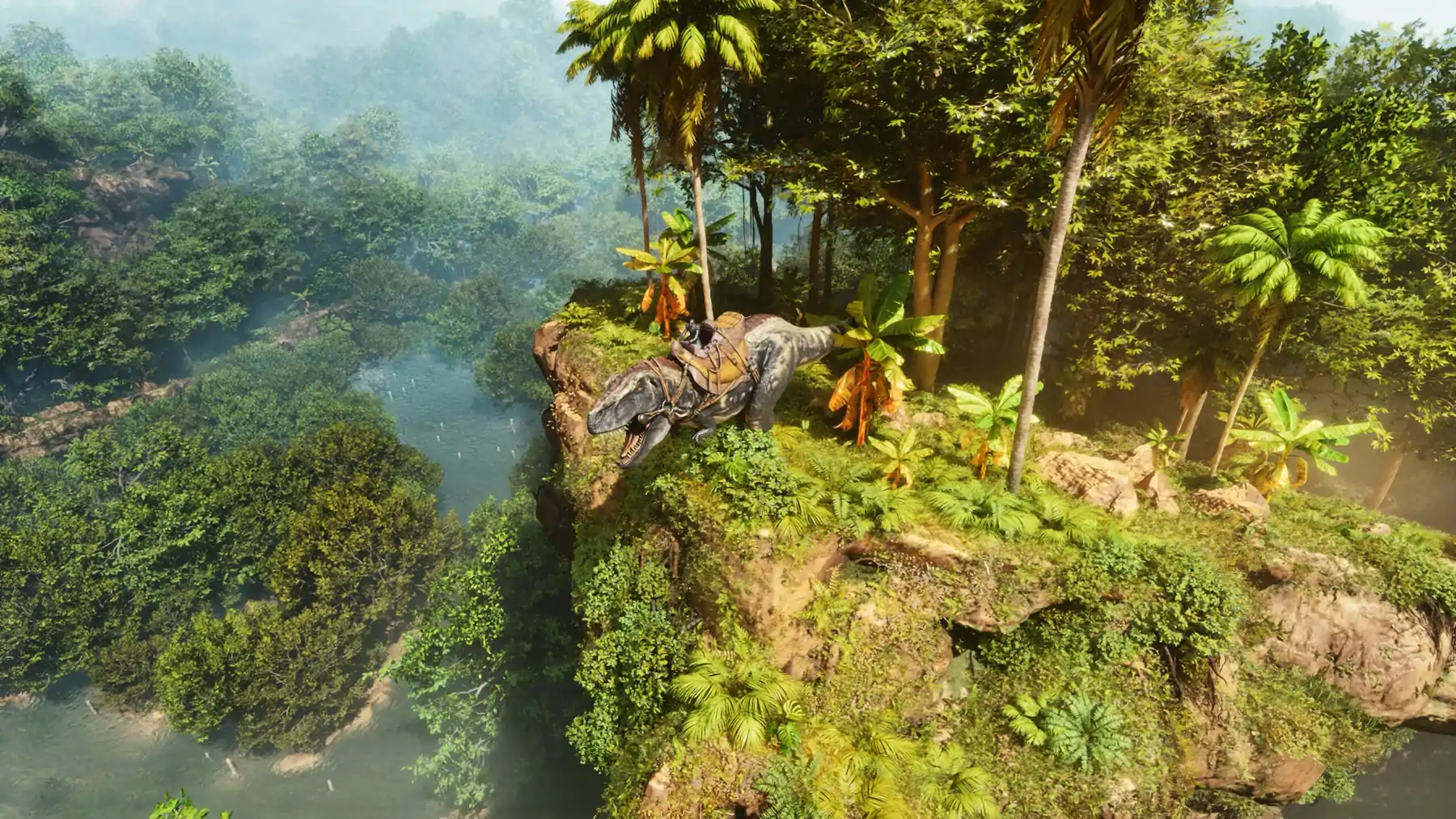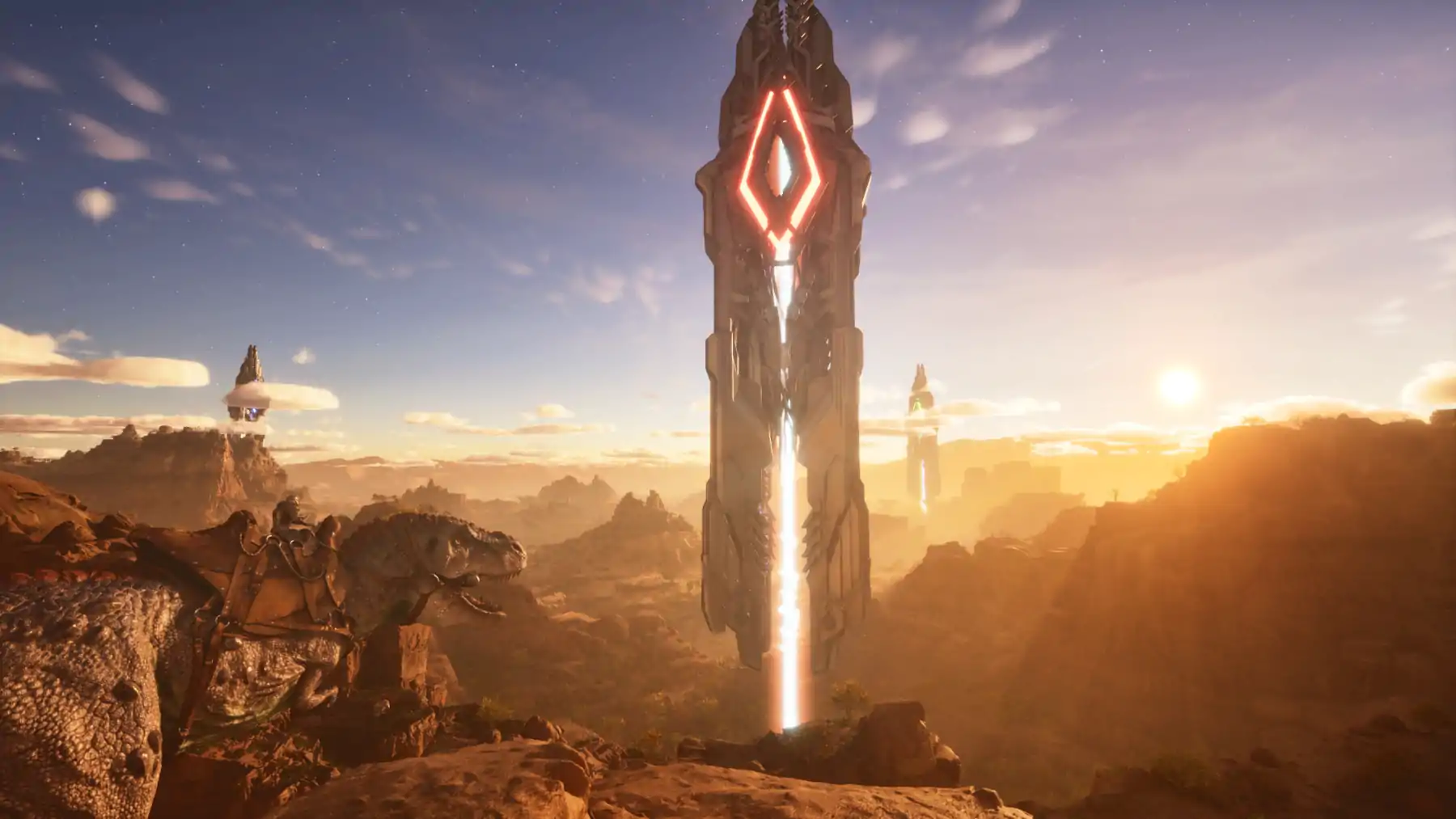There’s rarely a moment when one feels truly at ease among the harsh terrains of Studio Wildcard’s ARK: Survival Ascended. In a hostile world teeming with elemental hazards and prehistoric beasts that stalk the lands, seas, and skies, even the best outfitted human survivor can be caught off guard. It’s part of what’s made the ARK franchise so intriguing for millions of players around the world — that, of course, and the chance to ride on the back of a giant T-Rex.
“ARK is really a game about overcoming the odds,” DigiPen graduate Alex Williams says.
It’s also, he says, a game best played cooperatively with a team of friends, wherein players of all types can find their niche as they work together to build a base of operations — one typically filled with all manner of domesticated dinosaurs, or “Dinos” for short.
“For example, somebody might be a Dino breeder, and they like to breed perfect stats for the Dinos in your base. Somebody might be a base builder,” Williams says. “There’s always some guy who just likes to be a resource gatherer, and every day he’s going off and refilling the stockpile. And then there’s the guy who wants to actually go kill the hard stuff, like the alpha Dinos.”
If there’s anyone who understands the dynamics of a tight-knit creative team, it’s Williams. As a gameplay programmer at Studio Wildcard since 2018, he recently stepped up to become the company’s chief technology officer (CTO) last January, a high-level position that now sees him in charge of development on all major ARK game projects.
“I’m the last line of defense,” Williams says. “I’m responsible for making sure the product actually ships. I’m responsible for making sure the scope of that product — both from a technical and design perspective — will meet the deadline in mind.”
Although his present job title might be a lofty one, Williams didn’t achieve his career success overnight. On the contrary, much like a typical ARK player who begins their survival campaign with zero tools and experience points, Williams recalls how his own game development journey started out from scratch.
Like many DigiPen graduates of a certain age, Williams says he first learned about DigiPen at age 14 from Nintendo Power magazine ads. Convinced it was the school for him, but with no prior programming knowledge, Williams’ parents encouraged him to attend community college after high school instead.
“I think going into game development gave them the heebie jeebies at the time,” Williams says. “So I went to community college and I became a web developer.”
Though his parents were relieved, Williams says his long-term plans to continue his education at DigiPen never wavered. Eventually, at age 22 and with a few years of web-building experience under his belt, he enrolled in the BS in Computer Science in Real-Time Interactive Simulation program and moved across the state from Spokane, Washington, to begin his first year of studies in Redmond.
Almost immediately, he says, the experience was transformative.
“I basically describe it as changing the way I was thinking fundamentally, in way to prepare me for the world I was heading into,” Williams says. “I was literally a programmer before I went to DigiPen but with a totally different way of going about it.”
In spite of the steep learning curve, Williams says he looks back with fondness on his four years in the program.
“DigiPen was extremely hard as a boot camp,” he says. “At the same time, my DigiPen experience was so much fun and rewarding. And I really just pin that on the games classes. I made a few games over the years. I made them with the same four people all four years, and they’re still my friends today.”
His first professional opportunity came in the form of a student internship during the summer before his senior year. That’s when he got his start at California-based Gazillion Entertainment, makers of the online game Marvel Heroes. Pleased with his internship performance, the studio was happy to hire him as a full-time gameplay programmer after his graduation in 2011, and for the next five years, Williams worked to implement new features and functionality for their license-based superhero game.
“My proudest moment was when I built the movement for Ghost Rider’s motorcycle,” Williams says, pointing to just one of his many contributions on the project. “I had a great experience there. I made great friends that I’m still friends with.”
Unfortunately, after a series of financial struggles, the Gazillion studio officially shuttered in late 2017. All development staff were laid off, and for the first time since graduation, Williams found himself back on the job hunt.
“It was awful,” Williams recalls. “It was just, ‘Oh, man. Nobody will ever hire me.’ Lots of self-doubt.”
Fortunately, it didn’t take long for William’s career to rebound. Just a few months later, after moving back to his home state of Washington, Williams connected with Studio Wildcard, which had recently released the full version of their original hit game, ARK: Survival Evolved.
“I had a horrible interview with them, and then they hired me anyway,” Williams says with a laugh.
Once again, Williams hit the ground running on new features and gameplay content, this time for an increasingly popular survival game made famous for its robust crafting systems, modding scene, and dinosaurs galore.

“I started in on making a few Dinos,” Williams says. “I made the Velonasaur, which I think people think is super cool, but it definitely hurt server performance really bad. I tore down the servers with it a few times, but we got it back up and running. Then I made the Managarmr, which everybody absolutely loved, and I even saw some people make some plushies of that.”
Soon after his one-year anniversary at the company, Williams moved up to a lead gameplay programmer role, a promotion that came with a huge influx of new responsibilities, including more weekly meetings and production duties. For the first time, Williams was overseeing changes to the ARK experience across all platforms, including Xbox, PlayStation, Windows, and more. The promotion also put him in charge of the live-ops team, responsible for addressing many of the most time-sensitive issues affecting the online experience for players around the world.
“There are lots of emergency fixes and lots of very difficult bugs, because Wildcard stores a lot of player data,” Williams says, referring to things like aforementioned player bases, which can persist on the ARK game servers for years at a time. “Anything that risks that economy or that player data, it’s an absolute emergency. So I was often up late fixing those, deploying the servers myself.”
For the next several years, as Williams continued to gain the trust of studio leadership, his own effectiveness as a team leader was also becoming apparent. Williams points to one early moment when he identified some glaring inefficiencies in the way studio programmers were receiving written bug reports from the QA team, a process that too often resulted in several rounds of back-and-forth messages just to arrive at a baseline understanding of the issue in question.
I could never do a job where I stopped programming.
“I was like, this is obnoxious and awful. Where do the QA people hang out? And it turns out they hang out on Discord. So I just got myself added to their Discord, and I had them stream the game to me and have them show the thing that they were trying to do. And that just started a whole snowball effect,” Williams says. “I started solving bugs way faster. I started gluing the teams together, just because that became a better way to work. … That one little change shifted the culture in a much more positive direction.”
Still, when his bosses approached him at the end of 2023, a high-level promotion was the last thing he was expecting.
“That’s when they offered me the CTO role, and so here I am now. And it’s been a great job,” Williams says.
Reflecting more on his new role, Williams says his biggest strength as a team leader has less to do with his own technical prowess or being a rigid taskmaster. Rather, he says, it’s his deep firsthand knowledge of the skills and talents of the people around him, coupled with his aptitude for complex problem solving and communications.
“Given my resources, I am assigning the correct things to the correct people. We have one guy who can knock out dinosaurs all day long. He’s so fast. He can implement gameplay so fast, and everybody always ends up loving it,” Williams says. “It’s really just me negotiating with teams to help us meet the deadlines, and honestly, it sounds so awful, right? It sounds like something somebody wouldn’t want to be doing, but I swear it’s a lot of creative critical thinking that is actually fun and really keeps me engaged.”
That said, even as CTO, Williams still has his hands in the ARK codebase on a daily basis.

“Wildcard is a very multiple-hats studio, so I also have [development platform] Visual Studio open all day, and I’m programming and looking at code,” Williams says. “I could never do a job where I stopped programming.”
If Williams’ star at the company has risen during his tenure, so too has the studio’s flagship property, such to the extent that it now routinely attracts Hollywood star talent — whether that’s Vin Diesel starring in the 2020 reveal trailer for ARK II; David Tenant voicing the role of ARK series antagonist Rockwell; or any of the other A-list celebs joining the cast of the new TV spinoff, ARK: The Animated Series, which debuted on Paramount+ in March.
“That’s one of the really cool rewards is seeing these big names that you never would have expected to cross paths with are suddenly in your world,” Williams says. “And now the joke internally is that Vin Diesel gets my coffee.”
Meanwhile, Williams and his teammates remain grounded in the ongoing quest to deliver larger-than-life experiences for the global ARK community. He even pointed to one of his team’s newest creations — included in the game’s most recent DLC expansion — that has him particularly excited.
“It’s called the Shastasaurus. It’s a giant fish, like a megalodon, and it has a saddle that’s actually a submarine,” Williams says. “You can actually walk around inside of it, even though you’re underwater, and you can build structures in it.”
